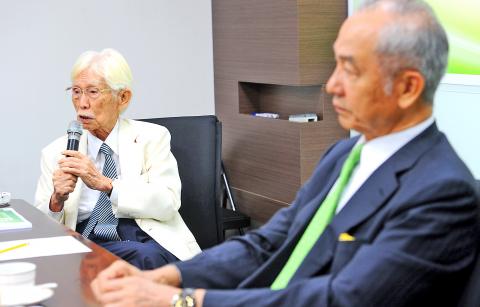A public opinion poll has found that a majority of respondents disapprove of President Ma Ying-jeou (馬英九) pushing the cross-strait service trade agreement through the legislature and do not understand his free economic pilot zones project.
The latest poll conducted by the pro-independence Taiwan Brain Trust found that 60.2 percent of respondents did not support Ma telling the Chinese Nationalist Party (KMT) caucus to push for the passage of the controversial trade pact in the extra legislative session that begins tomorrow, the think tank said yesterday.
Ma had promised during the Sunflower movement protests that the pact would not be screened before a monitoring mechanism for cross-strait negotiations and agreements is established.

Photo: Chang Chia-ming, Taipei Times
Most people appeared to have been skeptical about the free economic pilot zones project, which aims to serve as a model for business liberalization, with 85 percent of respondents saying that they did not understand the project well and 91.5 percent urging the government to clearly explain it to the public, think tank chairman Wu Rong-i (吳榮義) said.
The president’s most recent approval rating was 21.6 percent and his disapproval rating was 66.7 percent, while the KMT’s disapproval rating was 63.6 percent and 35.4 percent of respondents said the party was their least favorite political party, Wu said.
Meanwhile, more than half of those polled (53.1 percent) said the Sunflower movement has had a positive impact on Taiwan’s future democratic development, which was interesting, given that Ma and Premier Jiang Yi-huah (江宜樺) have said the protesters’ behavior was illegal and undemocratic, Wu said.
He said the most surprising finding of the survey was the high rate of support (75.1 percent) for drafting a new constitution.
The poll, which the think tank conducts quarterly, has questions on several basic issues regarding Taiwan’s identity, support for independence and support for unification.
The latest survey also found increasing grassroots awareness and support for a Taiwanese identity, especially among young people, think tank official said.
More than half (60.5 percent) of respondents identify themselves as Taiwanese — the highest level in the past five surveys since June last year — while those who identify themselves as both Taiwanese and Chinese (32.8 percent) hit a new low, the poll found.
The percentage of those identifying themselves as Chinese remained very low (2.9 percent), the poll showed.
In comparison with the results of the March poll, the percentage of respondents identifying themselves as Taiwanese rose from 64.6 percent to 72.9 percent in the 20-29 age group and from 54.2 percent to 63.2 percent in the 30-39 age group.
Think tank founder Koo Kuan-ming (辜寬敏) said a close examination of the survey results showed that young Taiwanese are no longer uninterested in politics.
Young people also believe that “Ma’s authoritarianism under the disguise of democracy is so unbearable that they will do whatever is necessary to fight it,” Koo said.
The survey was conducted between Thursday and Saturday last week. A total of 1,072 valid samples were collected and the poll’s margin of error is plus or minus 3 percentage points.

US climber Alex Honnold is to attempt to scale Taipei 101 without a rope and harness in a live Netflix special on Jan. 24, the streaming platform announced on Wednesday. Accounting for the time difference, the two-hour broadcast of Honnold’s climb, called Skyscraper Live, is to air on Jan. 23 in the US, Netflix said in a statement. Honnold, 40, was the first person ever to free solo climb the 900m El Capitan rock formation in Yosemite National Park — a feat that was recorded and later made into the 2018 documentary film Free Solo. Netflix previewed Skyscraper Live in October, after videos

Starting on Jan. 1, YouBike riders must have insurance to use the service, and a six-month trial of NT$5 coupons under certain conditions would be implemented to balance bike shortages, a joint statement from transportation departments across Taipei, New Taipei City and Taoyuan announced yesterday. The rental bike system operator said that coupons would be offered to riders to rent bikes from full stations, for riders who take out an electric-assisted bike from a full station, and for riders who return a bike to an empty station. All riders with YouBike accounts are automatically eligible for the program, and each membership account

A classified Pentagon-produced, multiyear assessment — the Overmatch brief — highlighted unreported Chinese capabilities to destroy US military assets and identified US supply chain choke points, painting a disturbing picture of waning US military might, a New York Times editorial published on Monday said. US Secretary of Defense Pete Hegseth’s comments in November last year that “we lose every time” in Pentagon-conducted war games pitting the US against China further highlighted the uncertainty about the US’ capability to intervene in the event of a Chinese invasion of Taiwan. “It shows the Pentagon’s overreliance on expensive, vulnerable weapons as adversaries field cheap, technologically

NUMBERs IMBALANCE: More than 4 million Taiwanese have visited China this year, while only about half a million Chinese have visited here Beijing has yet to respond to Taiwan’s requests for negotiation over matters related to the recovery of cross-strait tourism, the Tourism Administration said yesterday. Taiwan’s tourism authority issued the statement after Chinese-language daily the China Times reported yesterday that the government’s policy of banning group tours to China does not stop Taiwanese from visiting the country. As of October, more than 4.2 million had traveled to China this year, exceeding last year. Beijing estimated the number of Taiwanese tourists in China could reach 4.5 million this year. By contrast, only 500,000 Chinese tourists are expected in Taiwan, the report said. The report